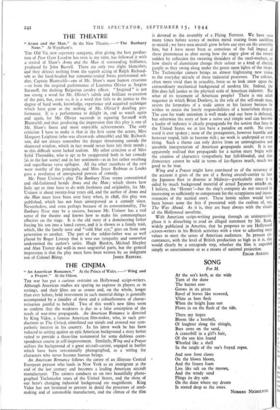THE CINJMA
" An American Romance." At the Prince of Wales.—" Wing and a Prayer." At the Odeon.
THE war has put a curious restraint on Hollywood script-writers. Although American studios are sparing no expense in players or in settings, and their films are as ornate and, on the whole, longer than ever before, bold investment in such material things is generally accompanied by a timidity of these and a colourlessness of charac- terisation painful to behold. Two of this week's new films seem to confirm that the weakness is due to a false conception of the needs of war-time propaganda. An American Romance is directed by King Vidor, a famous American film-maker, who, in such pro- ductions as The Crowd, stimulated our minds and aroused our sym- pathetic interest in his country. In his latest work he has been reduced to setting against an epic American background a story better suited to provide a three-line testimonial for some dubious corre- spondence course in self-improvement. Similarly, Wing and a Prayer utilises the background of a great aircraft-carrier, engaged in battles which have been sensationally photographed, as a setting for characters who never become human beings.
An American Romance follows the career of an illiterate Central European peasant who lands in New York as an immigrant at the end of the last century and becomes a leading American aircraft manufacturer. The camera conducts us on two beautifully photo- graphed Technicolor tours of the United States, and the shots of our hero's changing industrial background are magnificent. King Vidor has not hesitated to present in detail the processes of steel- making and of automobile manufacture, and the climax of the film is devoted to the. assembly of a Flying Fortress. We have seen many times before scenes of molten metal roaring from cauldron to mould ; we have seen aircraft grow before our eyes on the assembly _ line, but I have never been as conscious of the full impact of these phenomena as after seeing how the angry glow of the retorts redden by reflection the sweating shoulders of the steel-workers, or how sheets of aluminium change their colour to a kind of electric purple as they swing along under the green neon lights of the shops. The Technicolpr camera brings an almost frightening new vision
to the everyday miracle of these industrial processes. The colours, often more vivid than in actuality, force us to look anew upon the extraordinary mechanical background of modern life. Indeed, the film does full justice to the physical scale of American industry. But what of its treatment of American people? There is one adult sequence in which Brian Donlevy, in the role of the self-made man, resists the formation of a trade union in his factory because he wishes to retain the lonely responsibilities of a benevolent despot. The case for trade unionism is well made and our hero is defeated, but otherwise the story of how a naïve and simple soul can become a leader of industry is clearly propaganda for the notion that here in the United States we at last have a 'paradise on earth. No cross word is ever spoken ; none of the protagonists, however humble and however stupid, fails to become rich ; no work is underpaid or even tiring. Such a theme can only derive from an unimaginative and unsubtle interpretation of American propaganda needs. It is not apparently realised that propaganda for a nation must begin with the creation of characters sympathetic but full-blooded, and that democracy cannot be sold in terms of lay-figures much, much too good to be true.
Wing and a Prayer might have convinced us of the accuracy of the account it gives of the use of a fleeing aircraft-carrier to lure the Japanese fleet to disaster at Midway—particularly since it is aided by much background material of actual Japanese attacks on, I believe, the 'Hornet'—but the ship's company do not succeed in interesting us sufficiently to compensate for the scrappiness and incon- sistencies of the tactical story. These heroic sailors would have been heroes none the less if presented with the realism of, say, The Way Ahead. As it is, they are busy always with the rituals of the Hollywood novelette. With American script-writing passing through an unimpressr'n phase it is disturbing to read an alleged statement by Mr. Rank, widely publicised in America, that he proposes to use Hollywood ,screen-writers in his British activities with a view to adjusting story values to meet the tastes of American audiences. In present cir- cumtances, with the level of British production so high as it is, this would clearly be a retrograde step, whether the film is regarded simply as entertainment or as a means of national projection.
EDGAR ANSTEY.






















 Previous page
Previous page